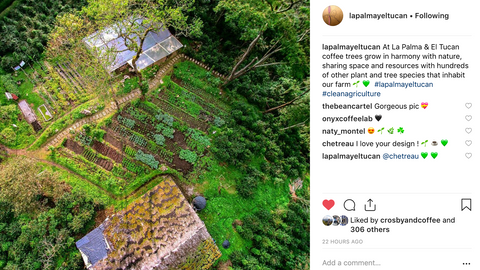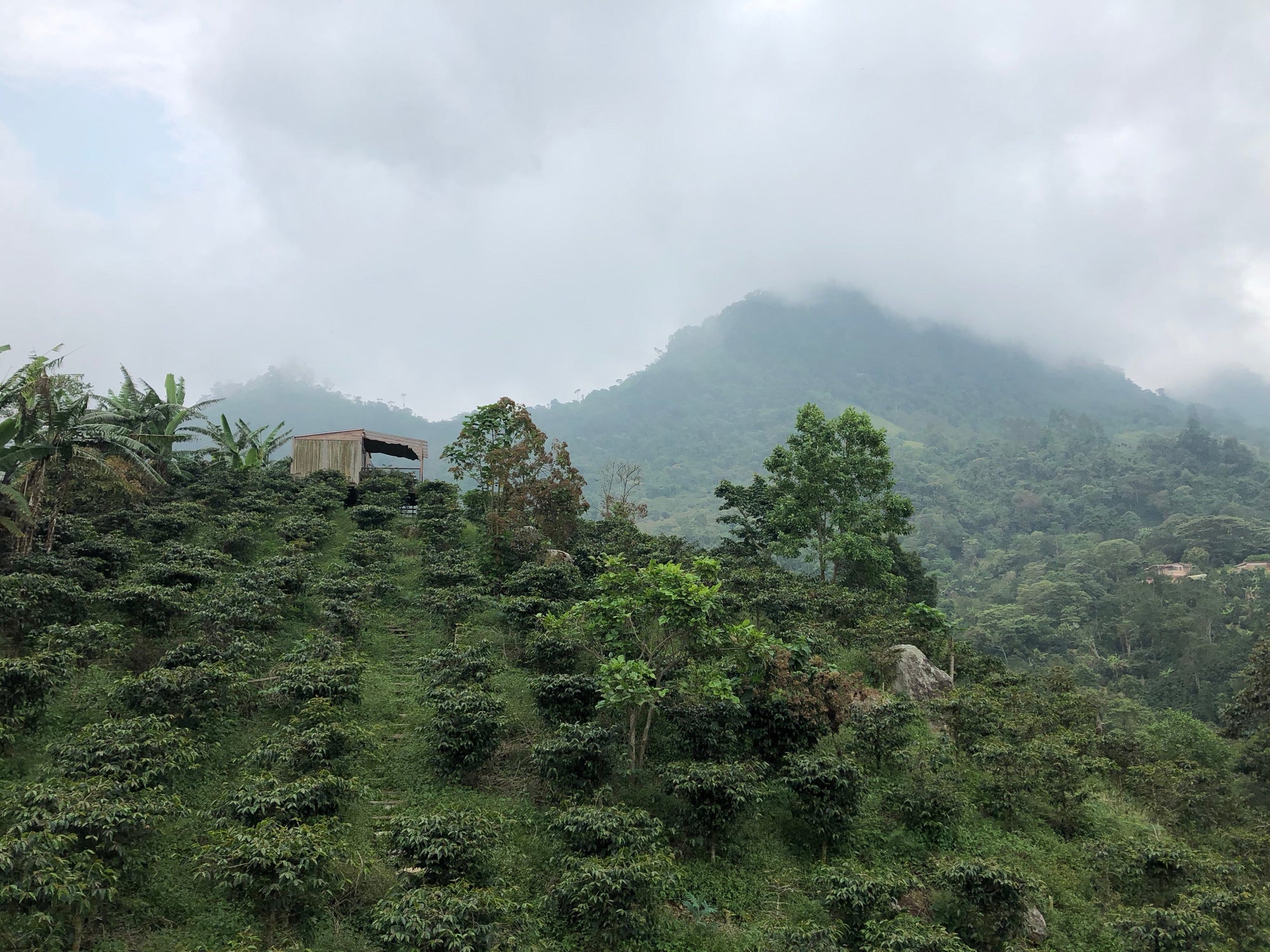

Our Third Visit to La Palma y El Tucan
It’s pouring rain and we’ve just left La Palma y El Tucan, to head to Bogota for a few days before leaving for Guatemala. This is our third visit to this legendary farm that we’re so proud to work with. Every time we’re here, we learn so much about coffee and we’re inspired by the immense focus placed on sustainability and the concepts for constant improvements. Two days spent with the visionaries Felipe Sardi and Sebastian Villamizar are honestly inspiring. The coffees are completely out of this world. This is the farm we represented in the 2018 World Barista Championships.
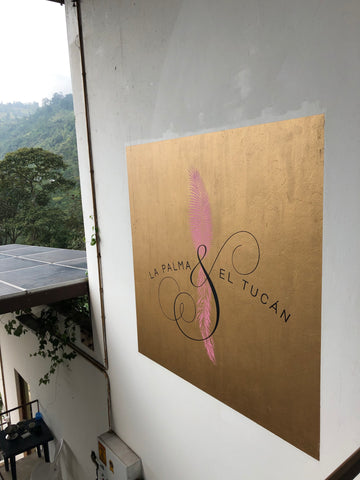
The farm is fully organic and has really become a model in the coffee world. We believe it's a replicable model and can potentially lead to a brighter future for the five hundred thousand coffee producing families in Colombia, and could be utilized further around the world.
There are 13 hectares of coffee planted on La Palma y El Tucan (I’ll refer to them as LPyET going forward). The varieties of coffee that have been cultivated on the farm are sought after for their unique, complex flavour profiles, such as Gesha, SL28, Sidra, Typica. Soon, they’ll also harvest Moka and Java. These coffees undergo strict guidelines of fermentation and processing, which elevate the acidities, the complexity and bring an absolute unique profile to each of the nano-lots they produce. After this trip, we’ve decided to bring in a small selection of three different coffees from LPyET, each of which needs a dozen or more flavour descriptors to bring justice to the complexity of the profiles.
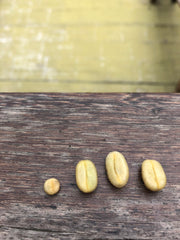
Though these individual coffees are outstanding and worthy of an entire article themselves, what I find most inspiring in this project is the commitment that LPyET has to working with their neighbouring farms and the families involved. They have a program they call Neighbours and Crops, which currently works with 200 families in the department of Cundinamarca. The way they work is unlike any coffee model we’ve encountered throughout our travels of green coffee buyers. LPyET purchases coffee cherries from these families and pays them about three times the price that the FNC (Colombian Coffee Growers Federation) is guaranteeing to producers. On top of this premium paid, LPyET has also committed to sending their team of expert coffee pickers to harvest the cherries, taking a lot of the stress and the hardships of single-handedly running a coffee farm from the families. They’ll then match 100% the weight of cherry purchased in organic compost for each family they’re working with. This compost is made at a dedicated facility at LPyET.
We visited a lovely lady named Maria Cristina, a 69-year-old retired school teacher, who had established a home and farm in Cundinamarca a little over 10 years ago. With her husband and son, she runs Los Refugios, a farm that works with the Neighbours and Crops program. She had nothing but positive things to say about her 3 years of partnership. Though she owns her own wet mill, she said it’s much more profitable, much less stressful and much more sustainable for her and her family to work with LPyET. It gives her the flexibility to focus on her chickens, her cattle and her health. She also has the ability to sell her remaining coffee to the FNC should she choose - as LPyET is only harvesting perfectly ripe cherries, there’s a percentage of coffee that’s left behind, over and under-ripe, and there’s still a market available for these coffees. Remember, in Colombia, the FNC guarantees that all coffee produced will be purchased within the country. She was positive about the Neighbours and Crops program with LPyET and how it might change the mentality for the younger generations who are becoming less interested in staying in the country to farm; but instead are moving to the urban centres to study and get professional, more consistent paying jobs.
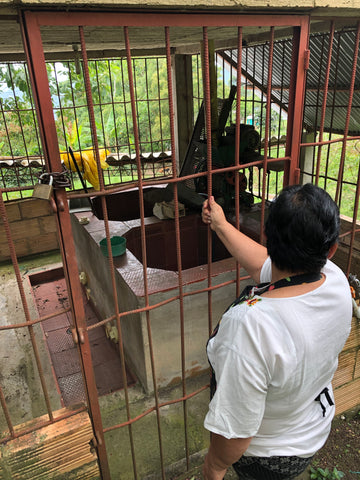
Something that’s a huge conversation in the coffee world right now is the C-market price and the livelihood for small scale coffee producers throughout the world. It’s said that on average it costs about $1.35US to produce one pound of green coffee. Today, the C-market price sits below that, meaning large multi-national corporations are greatly benefiting from reduced input costs, without any true care or regard for the small producers they’re buying from. There isn’t a true solution to this either, so it’s raised conversations in all sorts of coffee forums, trade shows and amongst coffee professionals worldwide.
There is a new project that LPyET is currently in the midst of rolling out, called Biodiversal, and it’s a whole new level of brilliance. Should it be successful, it’s an amazing way to provide consistent streams of revenue for small scale producers, while also bringing a level of security to potential food shortages. Here’s a little blurb on how it works.
Photo credit to LPET. A snapshot of their beta Biodiversal plot. Click the photo to see their instagram and learn more about their project.
The concept is based around the idea of poly-cultures. Traditional farming is referred to as mono-cultures, like is the case in most coffee farms or is also the case back home in Alberta with grains, potatoes, etc. The issue with a mono-culture type of system is different plants require different resources to thrive; and maybe one plant will deplete the soil of Nitrogen, while another is feeding off of Calcium or Potassium. The same goes with what a plant can contribute back into the soil. As an example, bananas are often planted in and around coffee to provide shade, but also to enrich the soils with Potassium. What Felipe has studied intensively is the idea of poly-cultures. He has recently begun removing nearly half of the trees producing coffee at LPyET, to clear space for other plants to be intercropped between the rows. The concept is to replace the coffee with plants that are contributing positive resources into the soils for the coffee to thrive on, while also diversifying the farms portfolio to other crops to be sold at local markets or, potentially, abroad. This is currently a concept and a beta test, but the speculation is that the overall quality of coffee will improve based on a greater wealth of nutrients available for each plant, and other revenue streams coming to life for the farm. Should this concept be a success, the plan is to work with the Neighbours and roll out a similar concept throughout their farms, bringing a more stable, year round income to coffee producing families in Cundinamarca, and potentially in other coffee producing regions, should word spread.
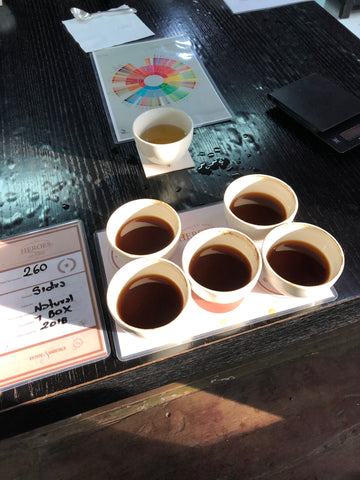
For now, we’re keen to see how things play out for LPyET and their constant innovation. People like Felipe and Sebastian are the reason we love what we do and why we travel to purchase our coffees. Seeing first hand the impacts they make with the quality of their coffee, the livelihoods of their neighbours and the vision for constant improvement is truly inspiring.
We can’t wait to share these coffees with you and to update you on how these amazing people continue to push the boundaries of coffee.
Tomorrow, Dave and I are giving a talk at Libertario, a coffee shop in Bogota, owned and operated by the same team at LPET. We’re then off to Guatemala to continue our quest to find and share the best coffees that we can find.
Here's a nice photo of Dave with Bourbon, one of the horses at La Palma y El Tucan as a reward for getting to the end of this journal :)
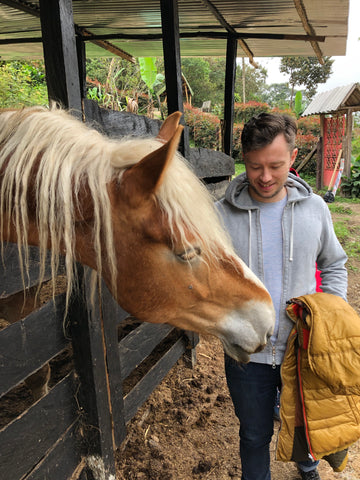
3 comments
-
Love reading the background story!
Frans on
-
Thanks for the fantastic info you are providing on your trip. It leaves one really thinking about how much work is put into the coffee production. My morning read to enjoy with a cup of Rosso coffee.
Cheri on
-
Thank you for taking the time to share and post your experience, giving us an awareness of where the coffee we so enjoy comes from and the amazing people that produce the cherry (beans)
Edie on











